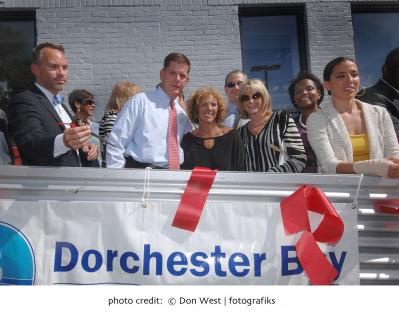September 11, 2014
 Quincy Street revitalization: Mayor Walsh and fellow elected officials at the Bornstein & Pearl Food Production Center opening on Monday. Photo by Don West
Quincy Street revitalization: Mayor Walsh and fellow elected officials at the Bornstein & Pearl Food Production Center opening on Monday. Photo by Don West
The $15 million, state-of-the-art Bornstein & Pearl Food Production Center is officially open for business after a ribbon-cutting ceremony on Monday at the long-vacant site of the departed Pearl Meats facility.
The 36,000-square-foot multi-use industrial food production facility will allow local food retailers of all sizes to prep their food with low overhead as they work to grow their businesses.
“The facility is a revitalized food production facility creating jobs for local people,” Daryl Wright, board president of the Dorchester Bay Economic Development Corp., told a crowd of more than 100 who had gathered for the occasion.
Wright hailed the project as “made in Dorchester,” meaning it was the “multiplied effort” of those who have “invested sweat and knowledge to bring this into being.” He said that “made in Dorchester means we can create jobs, fairness, and equity in the Fairmount and Quincy corridor.”
The factory sat empty for years after the Pearl Meats company relocated to Randolph before it was bought by Dorchester Bay a few years ago. The development firm worked with Crop Circle Kitchen to convert the more than 80-year-old meat plant into a facility that will allow for multiple permanent and rotating tenants.
“The Bornstein & Pearl Food Production Center will provide great spaces, add resources to grow businesses to scale, and create over 150 permanent jobs for people in the neighborhood,” said Jeanne DuBois, Dorchester Bay’s executive director.
Crop Circle Kitchen, Boston’s only non-profit shared use commercial kitchen and food business incubator, currently works out of a Jamaica Plain facility with 25 businesses. With the addition of the Pearl location, Crop Circle will be able to support another 40 to 50 businesses,” said Jen Faigel, a Crop Circle Kitchen board member.
The transformed Pearl location is also seen as a boon for neighbors. “In the planning process, the neighbors said they wanted jobs, so this idea came up,” said DuBois said. The Pearl facility is a part of a $100 million public-private investment between the city of Boston and community development corporations along the Quincy Street corridor. The new and renovated 129-unit Quincy Heights apartment complex abuts the Pearl location.
An array of elected officials, including Mayor Martin Walsh, was on hand for the launch of the new facility, as were the children and grandchildren of the Pearl and Bornstein families.
“When this opened, it was a predominantly Jewish area with a lot of delis,” said Gerri Pearl-Jamison, one of two Pearl daughters on hand. “Slowly, the landscape changed,” she said. “And they still stayed. The company was the cross section of people who lived here.”
Pearl-Jamison said she and her sister Lee Ann and the Bornstein grandchildren, Lori and Steve, all worked at the Quincy Street facility when they were growing up. She said they were excited about the transformation with its references to its origins on original Pearl Meats signs posted throughout the cinderblock facility. “And it’s still going to smell good,” Lori Bornstein said with a laugh. “It used to smell like hot dogs around here.”
Topics:


